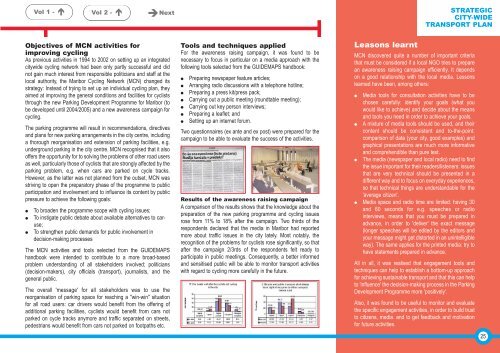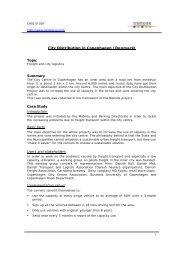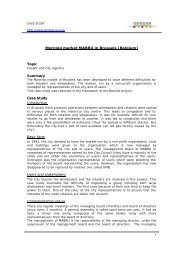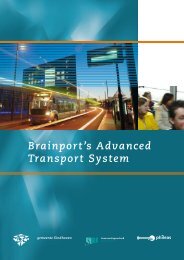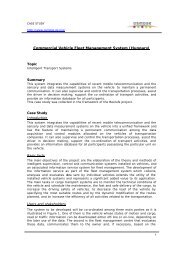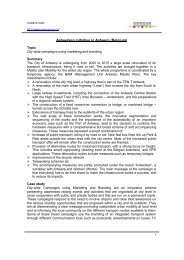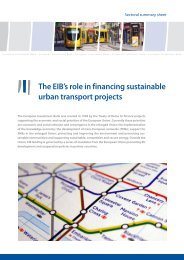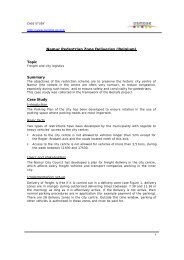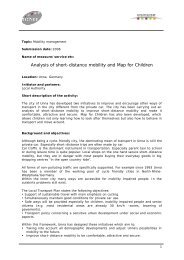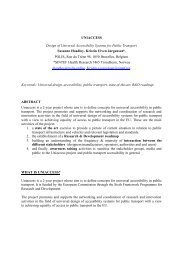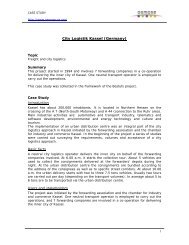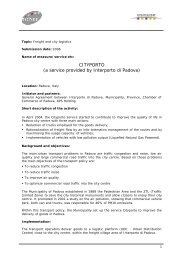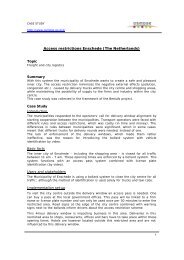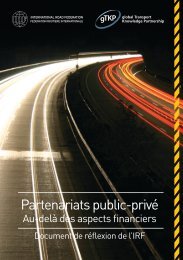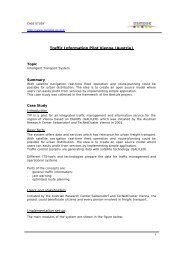Successful transport decision-making - Osmose
Successful transport decision-making - Osmose
Successful transport decision-making - Osmose
Create successful ePaper yourself
Turn your PDF publications into a flip-book with our unique Google optimized e-Paper software.
Vol 1 - !<br />
Vol 2 - !<br />
" Next<br />
STRATEGIC<br />
CITY-WIDE<br />
TRANSPORT PLAN<br />
Objectives of MCN activities for<br />
improving cycling<br />
As previous activities in 1994 to 2002 on setting up an integrated<br />
citywide cycling network had been only partly successful and did<br />
not gain much interest from responsible politicians and staff at the<br />
local authority, the Maribor Cycling Network (MCN) changed its<br />
strategy: Instead of trying to set up an individual cycling plan, they<br />
aimed at improving the general conditions and facilities for cyclists<br />
through the new Parking Development Programme for Maribor (to<br />
be developed until 2004/2005) and a new awareness campaign for<br />
cycling.<br />
The parking programme will result in recommendations, directives<br />
and plans for new parking arrangements in the city centre, including<br />
a thorough reorganisation and extension of parking facilities, e.g.<br />
underground parking in the city centre. MCN recognised that it also<br />
offers the opportunity for to solving the problems of other road users<br />
as well, particularly those of cyclists that are strongly affected by the<br />
parking problem, e.g. when cars are parked on cycle tracks.<br />
However, as the latter was not planned from the outset, MCN was<br />
striving to open the preparatory phase of the programme to public<br />
participation and involvement and to influence its content by public<br />
pressure to achieve the following goals:<br />
! To broaden the programme scope with cycling issues;<br />
! To instigate public debate about available alternatives to caruse;<br />
! To strengthen public demands for public involvement in<br />
<strong>decision</strong>-<strong>making</strong> processes<br />
The MCN activities and tools selected from the GUIDEMAPS<br />
handbook were intended to contribute to a more broad-based<br />
problem understanding of all stakeholders involved; politicians<br />
(<strong>decision</strong>-makers), city officials (<strong>transport</strong>), journalists, and the<br />
general public.<br />
The overall 'message' for all stakeholders was to use the<br />
reorganisation of parking space for reaching a "win-win" situation<br />
for all road users: car drivers would benefit from the offering of<br />
additional parking facilities, cyclists would benefit from cars not<br />
parked on cycle tracks anymore and traffic separated on streets,<br />
pedestrians would benefit from cars not parked on footpaths etc.<br />
Tools and techniques applied<br />
For the awareness raising campaign, it was found to be<br />
necessary to focus in particular on a media approach with the<br />
following tools selected from the GUIDEMAPS handbook:<br />
! Preparing newspaper feature articles;<br />
! Arranging radio discussions with a telephone hotline;<br />
! Preparing a press kit/press pack;<br />
! Carrying out a public meeting (roundtable meeting);<br />
! Carrying out key person interviews;<br />
! Preparing a leaflet; and<br />
! Setting up an internet forum.<br />
Two questionnaires (ex ante and ex post) were prepared for the<br />
campaign to be able to evaluate the success of the activities.<br />
Results of the awareness raising campaign<br />
A comparison of the results shows that the knowledge about the<br />
preparation of the new parking programme and cycling issues<br />
rose from 11% to 18% after the campaign. Two thirds of the<br />
respondents declared that the media in Maribor had reported<br />
more about traffic issues in the city lately. Most notably, the<br />
recognition of the problems for cyclists rose significantly, so that<br />
after the campaign 2/3rds of the respondents felt ready to<br />
participate in public meetings. Consequently, a better informed<br />
and sensitised public will be able to monitor <strong>transport</strong> activities<br />
with regard to cycling more carefully in the future.<br />
Leasons learnt<br />
MCN discovered quite a number of important criteria<br />
that must be considered if a local NGO tries to prepare<br />
an awareness raising campaign efficiently. It depends<br />
on a good relationship with the local media. Lessons<br />
learned have been, among others:<br />
! Media tools for consultation activities have to be<br />
chosen carefully: identify your goals (what you<br />
would like to achieve) and decide about the means<br />
and tools you need in order to achieve your goals.<br />
! A mixture of media tools should be used, and their<br />
content should be consistent and to-the-point:<br />
comparison of data (your city, good examples) and<br />
graphical presentations are much more informative<br />
and comprehendible than pure text.<br />
! The media (newspaper and local radio) need to find<br />
the issue important for their readers/listeners: issues<br />
that are very technical should be presented in a<br />
different way and to focus on everyday experiences,<br />
so that technical things are understandable for the<br />
'average citizen'.<br />
! Media space and radio time are limited: having 30<br />
and 60 seconds for e.g. speeches or radio<br />
interviews, means that you must be prepared in<br />
advance, in order to 'deliver' the exact message<br />
(longer speeches will be edited by the editors and<br />
your message might get distorted in an unintelligible<br />
way). The same applies for the printed media: try to<br />
have statements prepared in advance.<br />
All in all, it was realised that engagement tools and<br />
techniques can help to establish a bottom-up approach<br />
for achieving sustainable <strong>transport</strong> and that this can help<br />
to 'influence' the <strong>decision</strong>-<strong>making</strong> process in the Parking<br />
Development Programme more 'positively'.<br />
Also, it was found to be useful to monitor and evaluate<br />
the specific engagement activities, in order to build trust<br />
to citizens, media. and to get feedback and motivation<br />
for future activities.<br />
25


